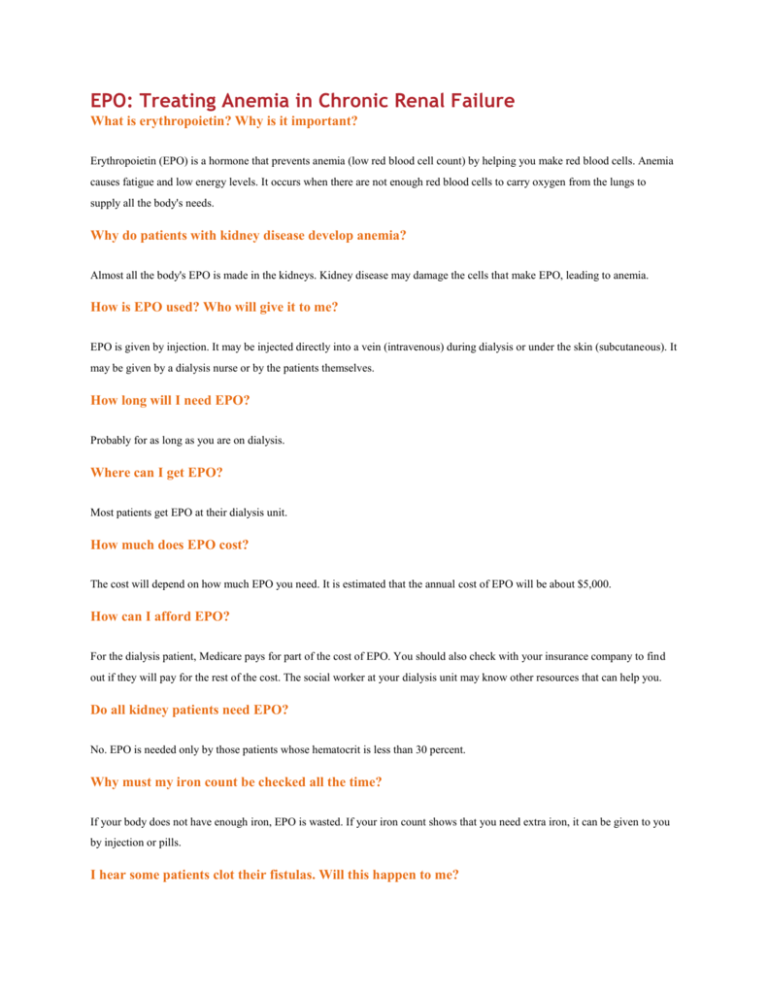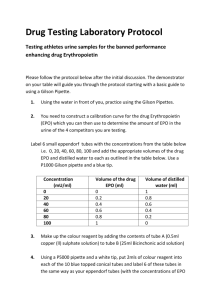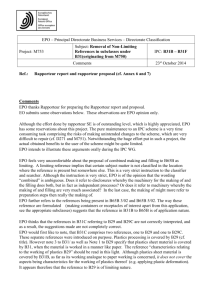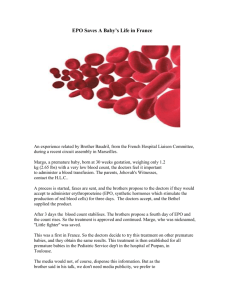Treating Anemia in CKD
advertisement

EPO: Treating Anemia in Chronic Renal Failure What is erythropoietin? Why is it important? Erythropoietin (EPO) is a hormone that prevents anemia (low red blood cell count) by helping you make red blood cells. Anemia causes fatigue and low energy levels. It occurs when there are not enough red blood cells to carry oxygen from the lungs to supply all the body's needs. Why do patients with kidney disease develop anemia? Almost all the body's EPO is made in the kidneys. Kidney disease may damage the cells that make EPO, leading to anemia. How is EPO used? Who will give it to me? EPO is given by injection. It may be injected directly into a vein (intravenous) during dialysis or under the skin (subcutaneous). It may be given by a dialysis nurse or by the patients themselves. How long will I need EPO? Probably for as long as you are on dialysis. Where can I get EPO? Most patients get EPO at their dialysis unit. How much does EPO cost? The cost will depend on how much EPO you need. It is estimated that the annual cost of EPO will be about $5,000. How can I afford EPO? For the dialysis patient, Medicare pays for part of the cost of EPO. You should also check with your insurance company to find out if they will pay for the rest of the cost. The social worker at your dialysis unit may know other resources that can help you. Do all kidney patients need EPO? No. EPO is needed only by those patients whose hematocrit is less than 30 percent. Why must my iron count be checked all the time? If your body does not have enough iron, EPO is wasted. If your iron count shows that you need extra iron, it can be given to you by injection or pills. I hear some patients clot their fistulas. Will this happen to me? This is not likely to occur. Studies have not shown an increase in fistula clotting related to EPO therapy or to a higher hematocrit. I have had a seizure in the past. Am I likely to have more seizures from EPO? No. EPO does not cause an increase in seizures. If you have had seizures, you should be taking anti-seizure medication. If high blood pressure develops suddenly, it could lead to a seizure. So, the best way to prevent a seizure is to make sure that your blood pressure stays under control. How can I take EPO if I go on a trip? The social worker at your dialysis unit may be able to help you arrange to receive your EPO at a dialysis unit you visit during your trip. It also may be possible for you to arrange to take the EPO with you (in a cooler) and inject it yourself. However, you should check with the health care team at your dialysis unit about this. If I feel better, will I need to dialyze as long? Absolutely. In fact, some patients need to dialyze for more hours to clear their bodies of the wastes from increased food as their appetites improve. Will EPO cure or improve my kidney failure? No. EPO is not a substitute for dialysis or for other therapy. However, it should make you feel much better. Will I ever need blood transfusions again? EPO should eliminate the need for blood transfusions unless you have a severe loss of blood such as that caused by bleeding ulcers or some surgical procedures. In these situations, a transfusion may be necessary since EPO acts slowly to increase the hematocrit. Does EPO need to be refrigerated? Yes. However, a temporary loss of electricity will not cause EPO to "go bad." Please do not let EPO freeze or get too warm. If you inject EPO yourself, always inspect your EPO vial before using it for your injection. Never use any EPO that is cloudy or discolored or has particles in it. If you have any questions about this, ask your doctor or nurse. Do any other medications interfere with EPO, and does EPO interfere with any medications? In general, EPO does not interfere with any other medications. At the present time, other medications do not seem to affect the action of EPO.







